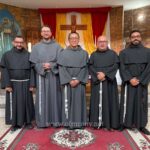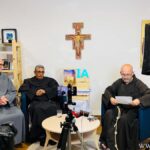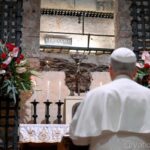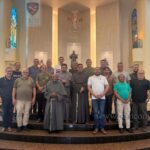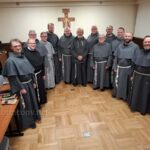Reflections on the International Seminar: “Nostra Aetate – Sixty Years Later”
On November 19, 2025, the “World Situation of Interreligious Dialogue” conference was held in the John Paul II Hall of the Pontifical University of the Holy Cross in Rome. The conference was part of the international seminar “Nostra Aetate. 60 Years Later,” held November 18-19, 2025. The main speaker was His Eminence Cardinal George Jacob KOOVAKAD, of the Dicastery for Interreligious Dialogue.
Initially, I did not intend to write anything, partly because I had only attended part of the event. However, two incidents changed my mind.
The first took place a few days ago, when a confrere of mine was talking about my duties as the Delegate for Ecumenical and Interreligious Dialogue. He told me that “all [interreligious] dialogue comes down to being friendly, but not becoming friends.” People from different religious traditions do have friendly relations with each other and that is a beautiful thing, of course; but there are some who say that’s where it ends. It goes no further.
The second incident took place during the seminar. In his final remarks, Cardinal KOOVAKAD spoke about his personal approach to interreligious dialogue. I asked him which model he preferred among the many developed over the years. He replied simply: “Being friendly,” and added: “even becoming friends.” As if to say: let’s go beyond superficial courtesy and arrive at a friendship that is true, authentic, sincere, and at its maximum potential.
Such an answer may disappoint those who expect immediately visible results, the fruit of the work of thousands of people over centuries. Like every generation, ours is impatient: we want to solve problems that have existed since time immemorial, but then we discover that we can’t. Carl Gustav JUNG had already intuited this: young people dream about conquering the world until they realize that the world will not be conquered by someone like them. This leads to frustration, resignation, and skepticism.
The same can happen with friendship. It becomes a challenge. Disappointment, misunderstanding, and suspicion are part of the journey. This happens when we reduce friendship to an unattainable ideal, almost an absolute perfection, like the biblical friendship between David and Jonathan.
However, I believe that neither my confrere nor the Cardinal were referring to that “ideal” form . Rather, they were talking about friendship based on listening, understanding, respect, kindness, and making oneself available. Our fraternities and, more generally, all human communities, should be shaped by these attitudes. Unfortunately, they are often lacking in our daily relationships. Perhaps this is precisely our vocation: to rebuild relationships, and for that, dialogue is needed—no matter what setting we apply it to.
It is easier to write an article for a conference or organize a joint service project than to transcend oneself, to open oneself to a new friendship, or to break down inner barriers.
Some point out that Jesus never talked about interreligious dialogue in the Gospels. However, if interreligious dialogue is a concrete form of friendship, then perhaps we could understand his words: “I have called you friends” (John 15:15) as a clear directive.
If I manage, in the next few years, to encourage even just a few of my confreres to experience such friendship with those who are not Catholic, or not Christian, it will be a worthy achievement.
Friar Sławomir KLEIN
General Delegate for Ecumenical and Interreligious Dialogue
P.S.
This is a small incident, perhaps marginal, but it’s significant. During the official photo that was taken of some of the key figures attending the seminar, Imam Nader AKKAD, from the Great Mosque of Rome, suddenly called me: “Father, come join us in this photo, please…my friend!” It made an impact on me. This simple gesture was more than courteous, it was truly friendly.








